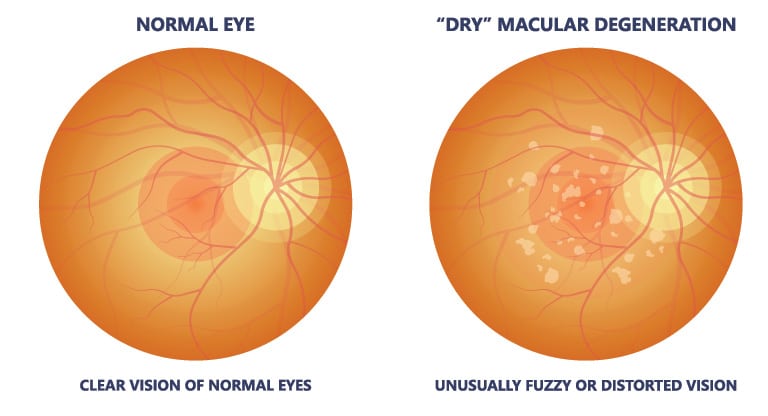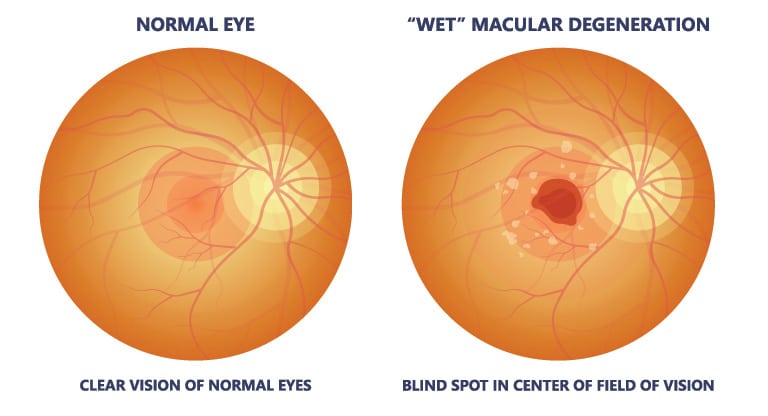What is Dry Macular Degeneration?
Dry macular degeneration, also known as atrophic age-related macular degeneration (AMD), is a chronic eye condition that affects the macula, the central portion of the retina responsible for sharp, detailed vision. It is the most common form of AMD and progresses slowly over time, leading to gradual vision loss. This condition primarily impacts central vision, which is crucial for reading, driving, and recognizing faces.
Dry AMD occurs when the light-sensitive cells in the macula break down and are replaced by yellow deposits called drusen. In its advanced stage, known as geographic atrophy, severe loss of central vision may occur due to the thinning and loss of retinal tissue.
Symptoms of Dry Macular Degeneration
Early stages of dry AMD often have no noticeable symptoms, but as the disease progresses, you may experience:
- Blurred or reduced central vision.
- Difficulty reading or recognizing faces.
- Increased need for bright light when performing tasks.
- A blurry or blank spot in the center of your vision.
If you notice any changes in your central vision, it’s important to schedule an eye exam for an accurate diagnosis.
How is Dry Macular Degeneration Treated?
While there is no cure for dry AMD, various treatments and lifestyle changes can help slow its progression and preserve vision:
AREDS Supplements
Specific combinations of vitamins and minerals, such as those found in AREDS (Age-Related Eye Disease Study) formulations, can reduce the risk of progression to advanced AMD.
Intravitreal Injections for Geographic Atrophy
For advanced dry AMD, known as geographic atrophy, innovative treatments have recently become available. Intravitreal injections can help slow the progression of retinal damage in appropriate patients, offering new hope for managing this severe form of the disease.
Lifestyle Changes
Maintaining a healthy diet rich in leafy greens, quitting smoking, and managing conditions like hypertension can support eye health.
Low Vision Aids
Magnifiers and other adaptive devices can help maximize remaining vision and improve quality of life.
Our team will evaluate your condition and discuss all available treatment options to create a personalized plan tailored to your needs.
Why Choose Retina Center of Chicago for Your Care?
At Retina Center of Chicago, we are committed to providing cutting-edge care for patients with macular degeneration. We are proud to offer state-of-the-art intravitreal injections for geographic atrophy, bringing the latest advancements in treatment directly to our patients. With advanced diagnostic tools and personalized treatment strategies, we aim to help you maintain your independence and quality of life. Our team is here to answer your questions, support your journey, and deliver the highest level of care.
What is Wet Macular Degeneration?
Wet macular degeneration, also known as neovascular age-related macular degeneration (AMD), is a serious eye condition that occurs when abnormal blood vessels grow beneath the retina. These blood vessels can leak fluid or blood, leading to rapid damage to the macula, the part of the retina responsible for central vision. Unlike dry AMD, wet AMD often progresses quickly and can cause significant vision loss if not treated promptly.
Symptoms of Wet Macular Degeneration
Wet AMD can develop suddenly, and early treatment is critical. Common symptoms include:
- Distorted vision, where straight lines appear wavy or bent.
- Dark or blank spots in the center of your vision.
- Sudden and noticeable central vision loss.
- Decreased ability to see fine details, such as reading small print.
If you experience these symptoms, it’s important to seek immediate evaluation.
How is Wet Macular Degeneration Treated?
At Retina Center of Chicago, we specialize in treating wet AMD with the latest advancements in care:
Intravitreal Injections
These injections deliver medications directly into the eye to block the abnormal blood vessel growth and leakage. Anti-VEGF (vascular endothelial growth factor) treatments, such as aflibercept, ranibizumab, and bevacizumab, are highly effective in managing wet AMD and preserving vision.
Personalized Treatment Plans
We use advanced imaging and diagnostic tools to tailor treatment schedules and medications to each patient’s unique needs, optimizing outcomes while minimizing discomfort.
Why Choose Retina Center of Chicago for Your Care?
At Retina Center of Chicago, we bring unparalleled experience and expertise to the treatment of wet macular degeneration. Having performed over 40,000 intravitreal injections, our team is highly skilled in delivering these sight-saving treatments with precision and care.
Our practice is dedicated to using cutting-edge technology and evidence-based practices to provide the best outcomes for our patients. With a commitment to compassionate care and personalized attention, we strive to protect and enhance your vision for years to come.




